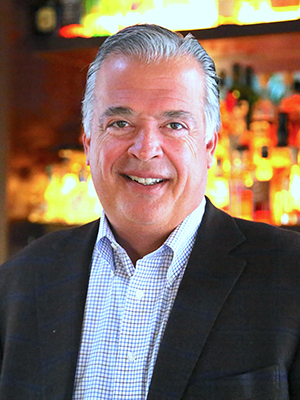Cameron Mitchell is the founder and CEO of Columbus, Ohio-based Cameron Mitchell Restaurants, which includes 37 restaurants under 15 different concepts, including the Ocean Prime brand. He is also author of “The Answer Is Yes. What Is the Question?” This article does not necessarily reflect the opinions of the editors or management.
Restaurants aren’t simply places [where] you eat. They’re gathering spots for families and friends, drivers of economic prosperity and part of the fabric of our communities.
Employees of the restaurant industry, including the dedicated associates of Cameron Mitchell Restaurants, pride themselves on providing genuine hospitality, and it is time that we, as a restaurant community, be the voice of those workers who need us now more than ever.
Our industry, which has been devastated by COVID-19, employs more than 15.6 million Americans and contributes $1 trillion to the U.S. economy. From mom-and-pop diners to innovative culinary independents to venerable international restaurant corporations — the negative impact of the coronavirus pandemic has varied, but it has been universal. Some will not survive it.
There is no contingency plan rich enough to respond to what is an unimaginable crisis.
 Photo: Cameron Mitchell
Photo: Cameron Mitchell
For mid-sized companies like ours, the impact has been widespread, and full understanding of the availability of state and federal support remains elusive. We must stand up as an industry to drive reforms to current relief plans available for restaurants.
Like my colleagues who’ve shared similar experiences, mid-March was among the worst times for our leaders and our team. We took a successful and expanding restaurant company from 26 years of growth to a hard stop, temporarily shuttering all locations across the country, closing our doors and telling nearly 4,500 associates they were being furloughed.
Knowing this decision would position them to access individual government benefits provided little solace as we watched our team grapple with how to make ends meet during this challenging time. To ease the burden, we established an Associate Relief Fund in March where 100% of online gift card sales were donated to our associates. This effort raised more than $600,000 thanks to the generosity of the communities in which we operate, helping put food on the table for our displaced associates.
And yet, restaurant owners like me face mounting bills for rent and insurance, as well as food and other supplies that went unused and more. We anticipate it will take up to six weeks and cost an average of $100,000 to reopen each of our 60 restaurants, including our specialty concepts, Ocean Prime and our sister company Rusty Bucket Restaurant and Tavern. As you may imagine, raising capital during this challenging time is no easy task.
Getting our restaurants reopened is a start, but we must also have enough funds to withstand further losses that will extend well beyond those created during the initial closures. I am concerned that many restaurants will reopen to 50% sales, due to social-distancing guidance and continuing consumer concern. This will create an ongoing sea of red ink that won’t allow their long-term survival. Restaurants will need access to additional capital to help minimize these losses until a full recovery from COVID-19 is achieved through vaccination and removal of social-distancing restrictions.
We have worked to secure a $10 million Small Business Administration loan, a valuable lifeline that will help us rebuild and reopen, but it only represents a portion of what will be needed to get open and stay open. While we are grateful for the government’s support, the reality is that more needs to be done as we prepare to climb the steep mountain ahead of us to reopen.
Unfortunately, the Coronavirus Aid, Relief and Economic Security, or CARES Act, does not completely address the restaurant industry’s unique and perilous financial situation. The sad truth is that it alone will not help most restaurants survive.
There are effective financial strategies for which I, along with industry leaders, am advocating that will benefit us and other restaurant companies. They include low-interest loans, tax credits for retaining associates, preventing landlords from evicting restaurants and requiring landlords to allow restaurants to pay back late rent over time.
Restaurants must rehire and retrain associates, secure food orders, reestablish vendor relationships and much more. These costs are real and significant — and the relief needs to be tailored to our unique needs. Necessary revisions should be made to current relief efforts to ensure restaurants of all sizes can rebuild in a post-COVID-19 world.
First, the forgiveness window for federal loans is only eight weeks, and it starts at the time the loan is made. This means that if our company doesn’t open until June or beyond, very little of the loan will be forgiven. Loan payments begin six months after the loan is made, and they are amortized over the next 18 months. For a business like mine, if we are only operating at 50% sales, we will not be positioned to absorb another large loan repayment.
Second, the 75/25 stipulated allocation [of the Paycheck Protection Program] between payroll and other expenses is not suited to the restaurant industry. For restaurants to survive, they need support for tremendous reopening costs that extend well beyond payroll.
Third, 80% of restaurant insurance policies have virus exclusions, making access to insurance claims unreachable for most restaurants.
For these reasons, I’m working with my colleagues, restaurant industry associations at the state and national level, and our congressional delegation to make specific requests of government leaders, including:
- Extending the forgiveness window to 16-20 weeks or even until the end of 2020;
- Changing the allocation rule for restaurants to 50% payroll and 50% other related costs, or otherwise update it to better position restaurants to fully address costs needed to reopen;
- Extending the amortization of any unforgiven loan amounts to five or 10 years; and
- Waiving virus exclusions and backstopping business interruption insurance so insurance companies can process virus-related claims.
These proposed changes are both fair and appropriate, and they represent the most feasible path forward for the nation’s restaurants and those we employ. We have an uphill battle ahead.
We built Cameron Mitchell Restaurants from the ground up, and I am confident we’ll do it again. That’s our responsibility to our associates, our vendors, our partners, our guests and the communities we call home — and it’s my commitment.





